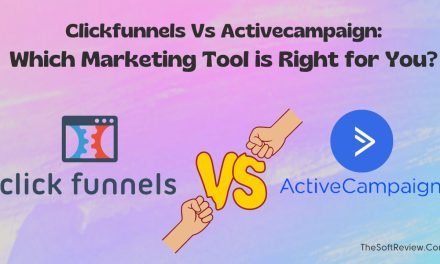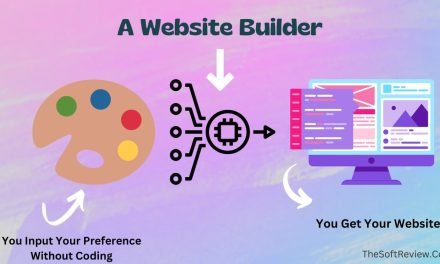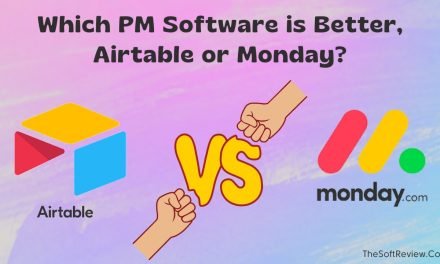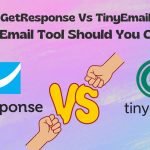
Clickfunnels Vs Shopify: Which Builder is Ideal for You?

Having a website or an online store has become essential for a business to sustain itself in this digital realm. And as technology evolved, the emergence of various website builders has made it easier for companies to establish an online presence with no coding expertise.
Among these builders, Clickfunnels and Shopify are the two most popular e-commerce website builders that businesses have been using for a long time.
But selecting the right site builder can be challenging, depending on what and how you want to sell. To clarify, we will compare Clickfunnels and Shopify to help you determine which website builder would be ideal for your online business.
- First, we will see an overview of both website builders.
- Then, we will explore the key features of a modern e-commerce website builder and examine how Clickfunnels vs Shopify perform on those parameters.
- Third, we will summarize the pros and cons.
- Lastly, we will share our final thoughts.
Round 1: An Overview of Clickfunnels and Shopify
Clickfunnels:

Clickfunnels is an e-commerce website builder specifically designed to help businesses create high-converting sales funnels (a sales funnel is a series of web pages a customer visits to make a purchase).
The platform was invented in 2014 by Russell Brunson and Todd Dickerson. Clickfunnels is known for its easy-to-use drag-and-drop sales funnel builder, marketing features, and high conversion rates.
Currently, over 25,000 companies are using Clickfunnels, and on October 4, 2022, Clickfunnels released its most awaited version, “Clickfunnels 2.0”.
Shopify:
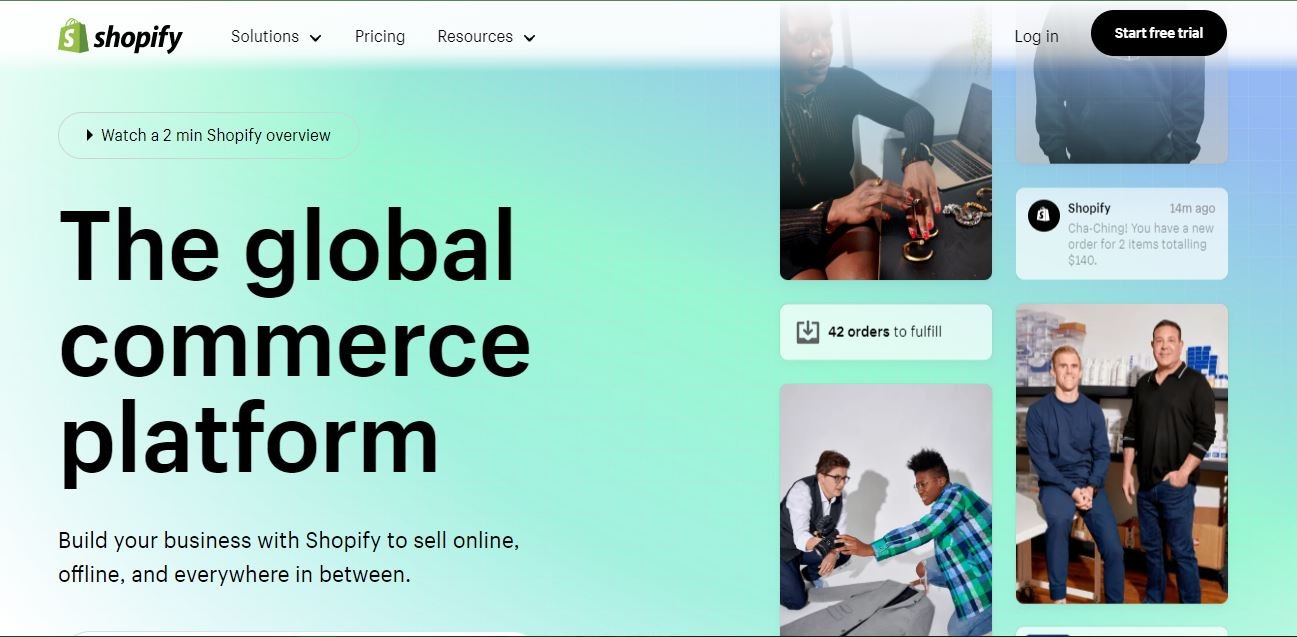
Shopify is a revolutionary e-commerce website builder designed to help you create a full-fledged online store without technical expertise. The platform was created in 2004 by Tobias Lütke, Daniel Weinand, and Scott Lake.
Shopify is known for its easy online store builder and ability to handle everything from product management to payment processing.
Currently, over 4.5 million online stores are created with Shopify, and each year the platform is upgrading its features so that the numbers.
Round 2: Head-to-Head Clickfunnels Vs Shopify Features Comparison
The below features are the pivotal components of a modern website builder, and we will measure how Clickfunnels and Shopify perform on these criteria:
- E-Commerce Website Building Capabilities
- User Interface and Ease Of Use
- E-Commerce Features
- Sales and Marketing Capabilities
- SEO Optimization
- Integrations
- Automation and Analytics
- Pricing Plans
- Customer Support
1. E-Commerce Website Building Capabilities and Customizability
A. Clickfunnels
Clickfunnels helps you to focus on one product at a time and generate more sales. Clickfunnels calls the technique “a sales funnel,” where you create a series of web pages that a visitor goes through and makes a purchase.
That’s what Clickfunnels offers you, a marketing and sales funnels builder that can help you capture leads and sell products without having to write code.
With Clickfunnels, you get an intuitive drag-and-drop funnel builder and 100+ lead and sales funnel templates. The drag-and-drop builder lets you easily edit most of a template’s parts.
And you can create multiple funnels to sell various products separately. For instance, the basic plan of Clickfunnels offers you to make up to 20 funnels, and the advanced plan allows you to create unlimited funnels.
Clickfunnels also offers you to create an e-commerce store. Still, the platform’s primary focus is its funnels, and the store is not that customizable compared with a dedicated online store builder!
B. Shopify
Shopify offers you to create a full-fledged online store and showcase thousands of products as you want. The platform has a drag-and-drop online store creator with many free and paid themes.
You can choose any theme and customize every aspect of your E-Commerce store, from the homepage to the product category page to check out.
On the other hand, Shopify has a developer mode sharing its APIs, allowing you to create any e-commerce experience you want.
The platform also allows you to create sales funnels like Clickfunnels, but the looks and feel need improvement.
2. User Interface and Ease of Use:
A. Clickfunnels
ClickFunnels is designed to help an ecommerce business create marketing funnels, and its user interface reflects that. The interface is intuitive and easy to use, and the drag-and-drop builder makes it easy to create landing pages, sales pages, and order forms.
The user interface is also customizable, allowing you to create a unique look and feel for your brand. However, ClickFunnels can be limiting for those who want to create a more complex e-commerce store with a broader range of products and features.
B. Shopify
Shopify facilitates users with a robust online store experience, and the online store builder offers more flexibility than ClickFunnels. Its user interface is straightforward, making it easy for businesses to manage products, process orders, and handle shipping and fulfillment.
With Shopify, you can easily manage a large inventory of products, set up payment and shipping options, and customize the online store as you want with a wide range of customizable options.
3. E-commerce Features:
A. Clickfunnels
- Shopping Cart Functionality and Payment Gateways:
Shockingly, Clickfunnels 2.0 does not have a shopping cart feature yet. The Clickfunnels team is working on this feature. However, it offers a checkout page to process orders from customers. The checkout pages can be customized to match the business’s branding, allowing for one-click upsells, down sells, and order bumps.
Clickfunnels can integrate with all major credit and debit cards and popular payment gateways, such as PayPal, Stripe, and Google Pay.
- Inventory Management:
Clickfunnels provides essential inventory management features that allow businesses to manage the number of products available for sale. You will need to integrate an advanced inventory management system to track your inventory levels and manage multiple warehouses.
- Shipping and Order Fulfilment
With EasyPost integration, ClickFunnels allows you to set up shipping rates based on the customer’s location and the product’s weight. You can also offer free shipping to customers and it integrates with popular shipping carriers such as UPS and FedEx, so you can easily print shipping labels and track shipments.
Similarly, ClickFunnels doesn’t have a built-in order fulfillment system, but it integrates with popular third-party fulfillment services such as ShipStation and Fulfillment by Amazon.
B. Shopify
- Shopping Cart Functionality:
Shopify offers a full-featured shopping cart functionality. It allows businesses to process orders from customers. Shopify’s shopping cart feature also provides various customization options, such as adding custom fields, discount codes, and gift cards.
At the same time, Shopify allows businesses to integrate with multiple payment gateways, including all the popular cards and online payment services like PayPal, Stripe, and others.
In addition, Shopify Payments supports over 100 currencies and allows businesses to accept payments in multiple languages.
- Inventory Management:
Shopify offers robust inventory management capabilities, allowing businesses to track inventory levels, set reorder points, and manage multiple warehouses.
Shopify also provides low inventory alerts and forecasting, which can help companies to ensure they have enough stock to fulfill customer orders.
- Shipping and Order Fulfilment
Shopify has a built-in shipping calculator that allows you to set up shipping rates based on weight, location, and order value. You can also offer free shipping to customers who meet a certain spending threshold.
Shopify integrates with popular delivery partners such as USPS, UPS, and DHL, so you can easily print shipping labels and track shipments.
Regarding order fulfillment, Shopify offers its own service called Shopify Fulfillment Network. It handles the storage, packing, and shipping of your products from its network of fulfillment centers. You can also use third-party fulfillment services such as ShipBob and others.
4. Sales and Marketing Capabilities
A. Clickfunnels
- CRM:
Clickfunnels offers a basic CRM system (built-in) that allows you to bring all the customer data to a centralized place to track interactions and segment them based on their behavior. The CRM is not robust but works for basic to intermediate-level use cases.
- Email Marketing Campaigns:
Clickfunnels has an in-built email marketing system that allows you to create and send personalized emails to your leads and customers. The platform also offers email automation and segmentation features, which can help to target the right people at the right time.
- Blogging (Content Management System):
Clickfunnels has a basic blogging feature to help you run content marketing campaigns and capture traffic from organic searches. Though the blogging system is not that robust, it works just fine to educate potential customers.
- Affiliate Program Management:
Clickfunnels has an affiliate program management system that allows businesses to create and manage their affiliate programs, track their performance, and pay commissions to their affiliates.
- Membership Sites:
Clickfunnels allows users to create and manage their membership sites, where they can offer exclusive content and services to their members.
B. Shopify
Shopify does not offer a built-in CRM or Affiliate management system. However, you can integrate with third-party CRM like Pipedrive and Refersion for affiliate management.
- Email marketing:
Shopify has an in-built email marketing tool that allows you to design eye-catchy emails and send them to your customer. The platform also allows you to segment your email list and automate email sending.
- Blogging (Content Marketing):
Regarding content marketing, Shopify also offers a basic blogging feature, which performs better than Clickfunnel’s blogging system.
You do not get all the blogging functionality like a dedicated blogging-focused website builder, but the Shopify blog still deserves a thumbs-up for its simplicity.
5. SEO optimization:
A. Clickfunnels
Regarding SEO features, Clickfunnels allows you to add custom meta tags for your website pages and blog posts, including titles, descriptions, and keywords. On the other hand, the platform provides clean and simple URL customization.
And some other SEO parameters like site speed, mobile responsiveness, domain, and hosting services are decent in Clickfunnels. The website builder should allow users to create a responsive website across devices like desktops, laptops, tablets, and mobile phones.
B. Shopify
Shopify gets an edge in terms of SEO solutions. Along with all the SEO features that Clickfunnels offer, Shopify gets an advantage for providing a wide range of SEO tools, including SEO Manager, Plug-in SEO, and SEO Image Optimizer, which gives you advanced SEO features.
6. Workflow Automation and Analytics:
A. Clickfunnels
As per workflow automation, Clickfunnels only offers the basic functionalities built-in. Such as email automation. To get more done automatically, such as capturing leads, helpdesk features, and advanced email automation, you must integrate Clickfunnels with third-party tools.
And if we talk about analytics, Clickfunnles offers an intuitive analytic dashboard to track your campaign performance and get insights, which is great for a mid-sized business.
B. Shopify
Shopify also offers numerous automation capabilities through its built-in app, Shopify Flow. With Shopify Flow, users can automate various tasks and processes, from marketing campaigns to inventory management.
One of the key benefits of Shopify Flow is that it enables users to create custom workflows that leverage their existing apps in the platform.
Another powerful feature of Shopify Flow is Launchpad, which allows users to schedule and run flash sales, product drops, and marketing campaigns on autopilot.
And in terms of analytics, Shopify offers a range of analytics features to help merchants optimize their online stores.
The platform’s dashboard, reports, and sales channel data provide an overview of store performance, while customer and marketing analytics help merchants better understand their audience and track the success of marketing campaigns.
7. Third-party Integrations:
A. Clickfunnels
Clickfunnels offers 5000+ third-party integrations with Zapier, which is constantly growing. From project management to supply chain management to CRM, you will find all types of free and paid integrations with Clickfunnels. And the integration process is smooth.
B. Shopify
Shopify also offers 5000+ integrations with Zapier, and you can integrate your store with almost any tried-party apps out there. From popular social media channels to advertising, to email, phone, or SMS marketing tools, all are possible—and not issues with integrability.
8. Pricing and Plans:
A. Clickfunnels Pricing
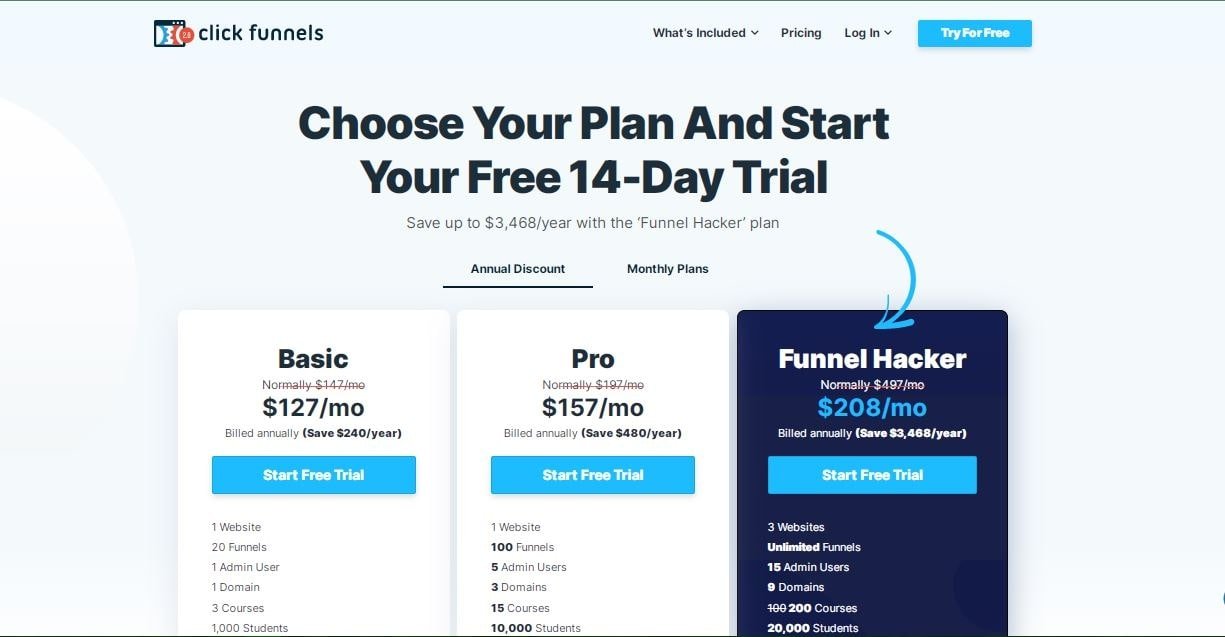
If we talk about the basic plan, we found the unlimited workflows, pages, products, and email sequences feature is handy at this price. But only one Admin User and Domain with the Basic Analytics can be insufficient for some users.
Thus, you should check out the 14-day free trial before you make any decision.
B. Shopify Pricing
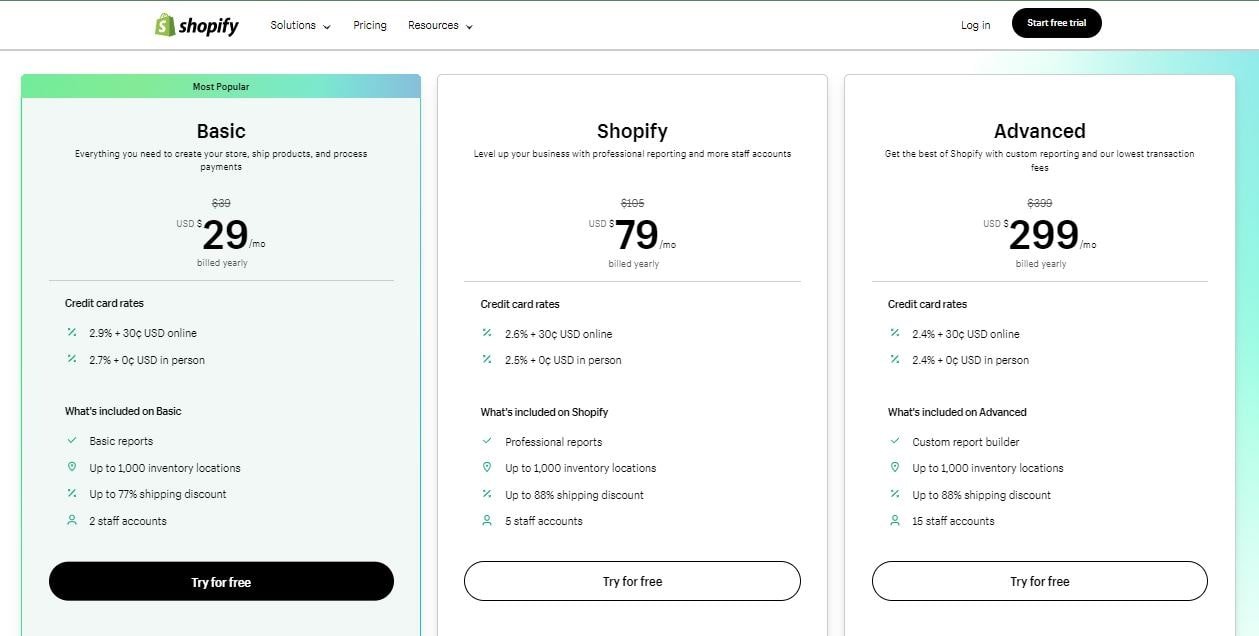
Shopify comes at a much lower price than Clickfunnel’s basic plan. You can get the Basic plan at $29 per month, and the more advanced plans come at $79 and $299 per month (billing annually).
Regarding the free trial, you get a 3-day free trial to see how the platform works.
And at this price point, the plans are worth trying if you need an e-commerce store builder.
9. Customer Support:
A. Clickfunnels
ClickFunnels offer robust support and resources to help users get started and succeed. The platform has a comprehensive knowledge base, an active community of users and coaches, and a 24/7 support team. You can get connect Clickfunnels support team via email and live chat.
B. Shopify
Shopify also offers adequate customer support and adequate resources to help you get started and grow your business. It provides a knowledge base, a vast online community with over 90,000 Shopify users, and a 24/7 support team.
You can get help from the Shopify team 24/7 via email, live chat, and phone.
Round 3: Calculating the Advantages and Disadvantages
A. Advantages of Clickfunnels:
- Focuses on selling one product at a time, which increases online sales
- Offers 100+ pre-built funnel templates with an easy-to-use drag-and-drop editor
- The built-in customer management system with an email marketing tool gives Clickfunnels an edge
- Includes a built-in affiliate management and customer page system
- Integrates with a wide range of tools and popular payment gateways
- Provides an intermediate level of analytics tools with A/B testing capabilities
B. Disadvantages of Clickfunnels:
- Focuses primarily on creating a landing and sales page rather than offering a complete e-commerce solution
- Limited customization options for the design and layout outside of the provided templates
- Higher pricing compared to some other e-commerce solutions
C. Advantages of Shopify:
- Powerful e-commerce platform with highly customizable themes
- Developer modes offer more advanced customizability
- Offers a range of e-commerce capabilities like payment and shipping options
- Provides advanced automation and analytics features
- Tons of third-party integrations and innovative features, including sales funnel creator and blogging tools
- Decent pricing plans for businesses of all sizes
D. Disadvantages of Shopify:
- The learning curve can seem steep for beginners, particularly while customizing the design
- It can get expensive when adding multiple apps and integrations
- Limited control over the back-end code and functionality, which can be a limitation for developers
Round 4: Final Thoughts: Which Platform is Right for Your Online Business (Clickfunnels vs. Shopify)?
Both Shopify and Clickfunnels are popular website builders for e-commerce businesses. They offer a range of e-commerce features and integrations, but you should evaluate your business needs before deciding.
1. Who Should Use Clickfunnels?
Clickfunnels is designed to create high-converting sales funnels! If you are an affiliate marketer, run a dropshipping business, or want to sell your own physical or digital products, focusing on selling one item at a time, you can use Clickfunnels.
Ensure your products are good enough to satisfy customers and advertise organizationally. Otherwise, you may not get back your investment.
2. Who Should Use Shopify?
Shopify was focused on creating an ecommerce store, but now it offers tons of sales and marketing tools. If you have plenty of products to sell and need a versatile e-commerce platform that is less expensive than Clickfunnels, then Shopify may be the right platform for you.
3. When Should You Use Both Clickfunnels and Shopify?
Many professionals use both Clickfunnels and Shopify simultaneously. They use the Shopify store to showcase all their products and use Clickfunnels only to create sales funnels for their “hot cake” products.
So, you can start with Shopify, and once you know which products are doing well, you can use Clickfunnels to create an online sales funnel and enhance sales. The Zapier integration makes it possible.





